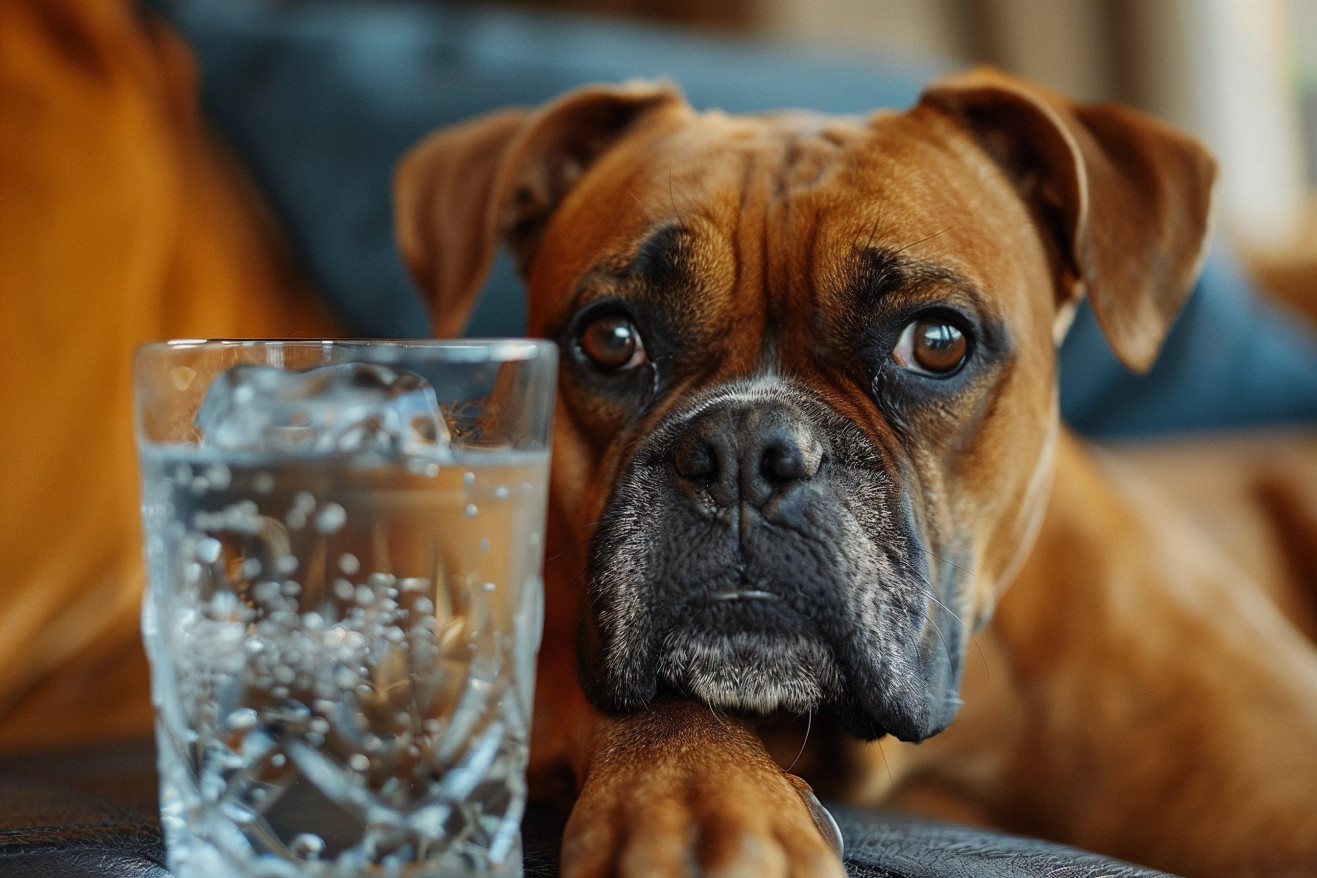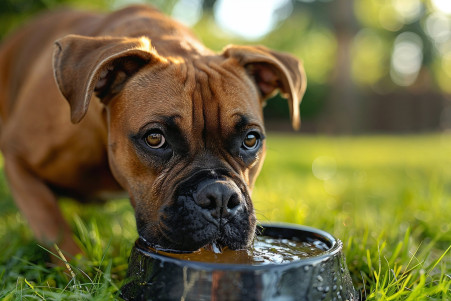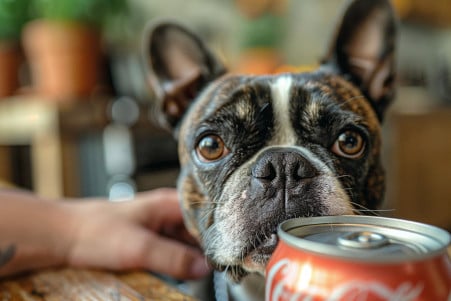Can Dogs Have Sparkling Water? What to Know About Safety and Health
28 February 2024 • Updated 27 February 2024

You love sparkling water, but can your dog enjoy it too? While dogs can have a little bit of unflavored sparkling water, it’s best to avoid giving it to them because it can cause issues like bloating and an upset stomach. Instead, you should stick to giving your dog fresh, still water to ensure they stay healthy and hydrated.
To get to the bottom of the great carbonation debate, we’ll take a close look at veterinary recommendations and nutritional research to find out how sparkling water impacts dogs. We’ll investigate the effects of sodium, the influence of carbonation, and the dangers of artificial sweeteners, including xylitol, in dogs. This investigation will help you better understand your dog’s hydration requirements and whether or not you can give them sparkling water as a special treat.
Can dogs have sparkling water?
Why Dogs Need Sodium
Sodium is an essential mineral that helps maintain cellular health and supports proper nerve and muscle function in dogs. According to IAMS, sodium is also needed to help regulate cellular fluids and prevent dehydration.
The Association of American Feed Control Officials has set a minimum requirement for sodium in dog food at 0.3% for growth and maintenance. However, healthy dogs can usually tolerate higher levels of sodium in their diet without any ill effects, such as high blood pressure or water retention.
That said, as the American College of Veterinary Pharmacists points out, too much sodium can lead to salt toxicosis, especially in small dogs. Since the amount of sodium in sparkling water can vary, it’s important for dog owners to read product labels carefully. While plain sparkling water is typically low in sodium, it’s important to make sure it’s within a safe range for dogs to consume.
It’s also important to note that the balance of sodium in a dog’s diet is important. As noted in Pet food safety: sodium in pet foods by Marjorie L Chandler, too much sodium can cause cells to lose water and damage important tissues, especially in the brain and nerves.
As a result, while the occasional sip of sparkling water is unlikely to cause any harm, it’s not the best choice for keeping dogs hydrated, and this is before even considering the potential impact of carbonation on a dog’s digestive system.
The Bubbly Truth: What Carbonation Does to Your Dog’s Stomach
Carbonation is the process of dissolving carbon dioxide gas into water, which creates the bubbles and fizz that people have come to love. For humans, this results in a temporary feeling of fullness and bloating, because the gas can build up in the stomach before being released. For dogs, however, the effects of carbonation may not be as harmless.
The feeling of carbonation can cause stomach upset in dogs that are sensitive to carbonated drinks, and their bodies have a harder time getting rid of the gas. LoveToKnow Pets warns that dogs that drink carbonated water can experience gas that can lead to bloating and even Gastric Dilation-Volvulus (GDV), a condition that causes the stomach to twist and is fatal if not treated.
While there is no veterinary research that directly links carbonated water to GDV in dogs, the risk is real. That said, it’s important to note that plain, non-carbonated water is the safest and healthiest way to keep your dog hydrated, and it’s the best way to ensure that your dog’s stomach stays healthy. In the interest of your dog’s health and safety, it’s best to avoid carbonated drinks altogether.
Artificial Sweeteners and Dogs: The Xylitol Warning
Artificial sweeteners are chemicals that are used to sweeten food and drinks without the calories that come with sugar. While they are a common way for people to cut back on their sugar intake, some artificial sweeteners, like xylitol, can be extremely dangerous for dogs.
Xylitol, a sugar alcohol, is used in an increasing number of sugar-free products, including some flavored sparkling waters. A study published in PubMed found that even small amounts of xylitol can cause dogs to develop hypoglycemia and liver failure, which can be fatal.
A study published in PMC found that xylitol toxicity in dogs can lead to acute hepatic failure, and that the symptoms of this failure can show up quickly, often within a few hours of ingestion. This makes it especially important to be cautious when giving dogs anything to eat or drink, especially if it’s labeled as sugar-free or low-calorie.
If a dog does ingest xylitol, the owner should take them to the vet immediately. According to the Journal of Veterinary Emergency and Critical Care, most dogs can make a full recovery with aggressive treatment and hospitalization if liver failure doesn’t occur. Knowing about the hidden dangers of products that seem safe, like flavored sparkling water, can help prevent accidental poisonings and keep our dogs safe and healthy.
Hydration Alternatives: What Kind of Water Can Dogs Drink?
Water is the foundation of good health for dogs, and it is necessary for many important biological processes. According to BetterVet, dogs need about one ounce of water per pound of body weight each day, but this can vary based on a dog’s size, breed, activity level, and environment. In general, the best and most reliable sources of hydration for dogs are unflavored, unsweetened, and clean water, whether from the tap or a filter.
That said, there has been a growing interest in nutrient-enhanced waters for dogs. In a study published in the journal PMC, researchers looked at the impact of nutrient-enhanced water on dogs and found that it led to an increase in total fluid intake and more dilute urine, which indicates better hydration status.
That said, these kinds of water should only be introduced under the guidance of a veterinarian and with care to make sure they don’t disrupt a dog’s diet or cause other health problems.
To make sure your dog gets enough water, make sure there are several water bowls around your home and encourage drinking by changing the water often. That said, while non-traditional water sources like nutrient-enhanced water may have their place, it’s important to make sure they are used to supplement, not replace, the regular provision of clean, fresh water to ensure the best for your dog’s health.
The pH of Your Dog’s Water Bowl: Is Sparkling Water Safe?
The pH of water measures its acidity or alkalinity on a scale of 0 to 14, with 7 being neutral. Just like people, dogs need to maintain a healthy pH level in their bodies. Studies have shown that dogs do best with slightly alkaline mineral water with a pH of 7.0 to 8.5, which helps reduce acidity and promotes good health. Going too far outside of this range can cause health problems, including stomach upset.
Because of the carbonation process, sparkling water is typically more acidic than still water, so it’s worth considering whether or not sparkling water is safe for dogs. According to Lifescienceswater, water is beneficial when mineral treatment increases the pH but can be harmful if the alkalinity goes above a pH of 8.5.
Meanwhile, Seychelle says that alkaline water is generally safe for dogs but recommends talking to a vet before making any changes to your pet’s diet, including water.
When you compare the pH of sparkling water to the recommended pH range for dogs, you may find that an occasional sip is safe but that regular consumption doesn’t meet the optimal pH for a dog’s health. As a result, it’s best to make sure your dog’s hydration comes from clean, fresh, and pH-balanced water, which is the best option.
Key Takeaways on Keeping Your Dog Hydrated
Based on our investigation into whether dogs can have sparkling water, there are several important takeaways that all dog owners should keep in mind. Sparkling water is an unnecessary risk for dogs because of its carbonation and potential sodium content, which can cause bloating and even more serious conditions like Gastric Dilation-Volvulus.
In addition, artificial sweeteners, especially xylitol, which is found in some flavored sparkling waters, are poisonous to dogs and can cause life-threatening medical issues.
Veterinary professionals all agree that the best way to keep your dog hydrated is to make sure that they have access to fresh, still water. This basic but important practice will help support their overall health and digestion while avoiding the potential issues that other sources of hydration can cause.
Always talk to a vet before making any changes to your dog’s diet, including the type of water that you give them, to make sure that you get advice that’s specific to your pet’s individual health needs.
In the end, the bottom line is that making sure that you’re making the right choices for your dog’s health and well-being when it comes to hydration is an important part of being a good and responsible pet owner that will help you build a stronger bond with your faithful friend.


